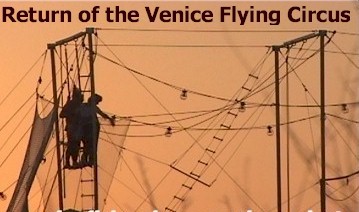 In a surprise court appearance last Wednesday hedge fund owner Art Nadel pled guilty in a New York Federal court.
In a surprise court appearance last Wednesday hedge fund owner Art Nadel pled guilty in a New York Federal court.
It was a bitter disappointment to swindled investors, as well as to interested onlookers anxious for a trial, to get a glimpse of not only how he did it, but who he did it with.
Nadel’s guilty plea may have removed the best—maybe the only—chance to make accountants and bookkeepers and managers at feeder hedge funds, all of whom had front row seats to the scandal, face public scrutiny while testifying about what went on at Scoop Management.
Most people find it impossible to believe he acted alone.
Nadel isn't tall, rangy, and CIA-connected, like fellow Ponzi All Star Allen Stanford, or even burly, like Bernie Madoff, but meek-looking, and unprepossessing physically. He's the Woody Allen, or, for those old enough to remember, the Wally Cox of Ponzi World.
There's lots of anger among jilted investors, who stand little chance of getting back anything more than a few pennies on the dollar of the $168 million they're estimated to have lost.
Why do Florida lawyers all seem like extras from "Body Heat?"
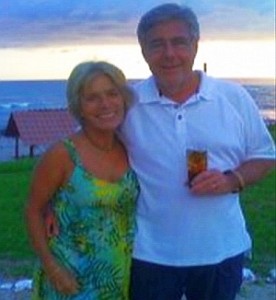 If they're counting on Tampa attorney Burton Wiand's help, they may be waiting a long time. Many actions taken by Wiand since being named the federal receiver charged with unraveling Nadel's finances last January seem open to question.
If they're counting on Tampa attorney Burton Wiand's help, they may be waiting a long time. Many actions taken by Wiand since being named the federal receiver charged with unraveling Nadel's finances last January seem open to question.
Real suspicions should also focus on what he hasn't done. Reading court transcripts can sometimes be eye-opening…
Long-time SEC lawyer Wiand dragged his feet (top snippet) on supplying Nadel's files, which he'd seized in the civil action he's involved in against Nadel, to federal prosecutors in New York charged with convicting him in criminal court, clearly higher priority.
Perhaps more importantly, his testimony in September revealed that he's not going after any money, other than his own ($750,ooo reportedly so far), with anything like the vengeance his job description promises jilted investors.
When he went back to court asking for more money last summer, the brief he filed said, "One of the receiver's highest priorities is to locate and recover any additional funds."
Yet three months later, almost nine months after he was appointed, Wiand's testimony revealed that he's aware, though somewhat vaguely, of $5 million he's owed from Christopher and Neil Moody… but he hadn't gotten around to asking them about it.
Wiand to investors: "The check's in the mail"
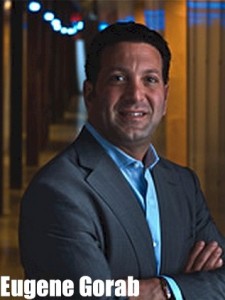 If things look bad for Nadel's hapless investors, the outlook for the citizens of Venice, Florida, where Nadel owned the same business that earlier trained Mohamed Atta to fly, looks absolutely bleak.
If things look bad for Nadel's hapless investors, the outlook for the citizens of Venice, Florida, where Nadel owned the same business that earlier trained Mohamed Atta to fly, looks absolutely bleak.
For them, Nadel’s descent, "from hedge fund owner to handcuffs," may feel a little like going from the frying pan into the fire.
The chief lieutenant of the new owner of the former Huffman Aviation, who is often named President of the various financial entities of his boss, was at the heart of a Wall Street scandal that was—until the financial meltdown last year—the biggest and costliest scandal Wall Street had ever seen.
The name of the new owner, which a Venice City Attorney told the Venice City Council they had no right to know, is Eugene Gorab.
Gorab, who claimed to be worth more than 100 million dollars in an interview with the Sarasota Herald Tribune last year, made his pile buying and selling hotels and casinos.
He worked for a hugely successful tycoon named Barry Sternlicht, who, while Gorab was working for him, owned more casinos than anyone on the planet.
We know what you're thinking. But wait. It gets worse.
 Gorab owns the majority stake in private equity fund Greenfield Partnersin Norwalk Connecticut, just a few exits up the Merritt Parkway from Greenwich, where Fairfield Partners helped Bernie Madoff relieve investors of unwanted capital.
Gorab owns the majority stake in private equity fund Greenfield Partnersin Norwalk Connecticut, just a few exits up the Merritt Parkway from Greenwich, where Fairfield Partners helped Bernie Madoff relieve investors of unwanted capital.
More interesting by far is that Gorab owns Clayton Holdings, a company whose failures in due-diligence played a direct role in the multibillion dollar collapse of the nation's housing market.
Clayton Holdings is the nation's largest due-diligence company: a firm which is hired by investment houses to make sure blocks of loans meet the seller's own standards.
Despite the fact that the underlying home loans didn't get within shouting distance of meeting those quality standards, Clayton Holdings paid off like a slot machine, signing off on the mortgage investments, the instrument of mass destruction which has succeeded in bombing the American economy back to the Stone Age.
Gorab, who didn't own Clayton Holdings until recently, wasn't responsible. He bought the company asClayton’s former President received immunity from New York’s Attorney General Andrew Cuomo in return for testimony about underwriting "exceptions" his firm’s project managers gave its Wall Street accounts.
Will Eugene Gorab—the man who now owns Huffman Aviation—let the world take a look at Clayton's books?
When pigs fly, is our guess.
The Straw Men
 Definition of “straw man”: noun (CRIME) n (also man of straw): Someone, often an imaginary person, who is used to hide an illegal or secret activity.
Definition of “straw man”: noun (CRIME) n (also man of straw): Someone, often an imaginary person, who is used to hide an illegal or secret activity.
Example: “The fraud depended on hundreds of bank accounts being opened on behalf of straw men.”
The three lads who say they're the owners of Huffman Aviation refuse to release the names of their just-created company's investors. So how can we say we know Eugene Gorab owns Huffman Aviation?
Simple: Gorab, for starters, already owns Volo Aviation in Sarasota. He has, give or take, $100 million in aviation investments, which is $100 million more than the three lads claiming to be the owners. More importantly, the trio were all working for Gorab when they bought it.
And he didn't fire them for competing with the company where they work.
Finally, we know Gorab owns Huffman because, even though there's a new front man at Volo Aviation at the Sarasota Airport, he's Gorab's chief lieutenant, the President of Gorab's Volo.
Eugene Gorab is adept at moving the pea around under the cup. We would have expected no less.
Meet Thom Harrow. He's "working to keep your trust."
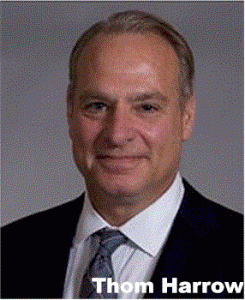 Thom Harrow, most recently listed as President of Volo Holdings, has been an officer of a myriad of Gorab's shell companies, which change with bewildering regularity, which may well be the point. Example: the "ownership of Volo Sarasota just changed hands, again.
Thom Harrow, most recently listed as President of Volo Holdings, has been an officer of a myriad of Gorab's shell companies, which change with bewildering regularity, which may well be the point. Example: the "ownership of Volo Sarasota just changed hands, again.
Harrow now operates at least four FBO’s (including the one in Sarasota) under the banner of APP, which stands for Airside Property Partners.
Airside Property Partners, in turn, is owned by Airside Investors, which owns the website airproperty.net.
Only God, and the state of Delaware, knows who owns Airside Investors. But if their names were to magically appear, we bet the name "Gorab" would be there.
Thom Harrow, it, turns out, has had an interesting, and some might say—hell we'll say it—checkered career.
Remember the old TV commercials for The Rock? Prudential Securities? Their commercials all ended with this catchy phrase: "The most important thing we earn is your trust."
As it turns out, it wasn't true.
Harrow was a senior executive at Prudential Securities during the late 80’s and early 90’s, while executives and brokers at the company were busily engaged in what reporters— in those far more innocent times—called thelargest fraud in US history.
Prudential brokers and executives defrauded investors of $8 billion.
No other Wall Street scandal to that time had come even close to touching the debacle at Prudential. Mike Milliken (junk-bonds, remember?) at Drexel Burnham, was a piker by comparison, settled for $650 million, a pittance by the $8 billion gold standard Prudential was setting.
According to NEWSWEEK:
"In this topsy-turvy world due diligence was a sham, brokers were hounded — even fired — for questioning the quality of deals, and no executive displayed much interest in knowing what was really going on."
Does that sound familiar? Due diligence was a sham? And now Thom Harrow's partner owns the company doing more due diligence than any other.
Kurt Eichenwald covered the story for TIME magazine, then wrote a book about the scandal called, appropriately enough, "Serpent on the Rock."
According to a review of his book in the New York Times:
"Eichenwald presented an appalling indictment of managers who did dozens of deals with a convicted embezzler, spent millions of investors' dollars on lavish trips to places like Cancun and Maui, and made cozy arrangements with developers to make themselves rich no matter how their clients fared."
But wait…We get ahead of ourselves. In fairness, Thom Harrow himself wasn't charged with a crime. He deserves the benefit of the doubt. He might have been one of the good guys who stuck around to clean up the mess.
We like to think the best about people. We're sure you do, too.
Locking-in profits for decades to come.
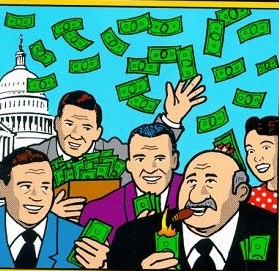 Discovering that Harrow was working for "The Rock" when it melted into something like butter was no easy task.
Discovering that Harrow was working for "The Rock" when it melted into something like butter was no easy task.
For the most part Harrow's bios neglect to mention it.
But in his bio included in the literature of a Louisiana company, presumably a friendly audience, he left it in.
Thom Harrow is, currently, the Treasurer of a Baton Rouge Louisiana-based non-profit charity called Provident Resources Group.
Provident's literature shows them to be involved in providingresources (hence the name, we assume) in the following fields:
CitiState (sic), Education, Healthcare, Housing, and Senior Living.
Here's how they describe themselves:
"Based in Baton Rouge, La., Provident Resources Group is a not-for-profit organization with the mission of serving the needs of the elderly; promoting and advancing health care; assisting the poor by providing affordable housing; lessening the burdens of government; promoting and advancing education; and preserving the environment."
In the pursuit of its charitable mission, Provident has become a national non-profit organization committed to the development, ownership and operation of state-of-the-art health, education, senior living, and multi-family housing facilities and services across the country.
“Furthermore, Provident actively strives to assist state and local governments in lessening the burdens they face in providing many needed services to their citizens.”
Its all good. Right?
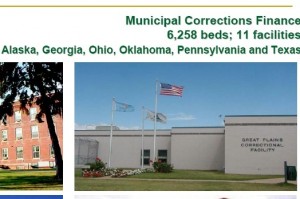 When we realized what the company actuallydoes, it came as something of a shock. When not "actively striving in pursuit of its charitable mission, they build and run private prisons.
When we realized what the company actuallydoes, it came as something of a shock. When not "actively striving in pursuit of its charitable mission, they build and run private prisons.
Eleven Private Correctional Facilities, to be exact, in Texas, Oklahoma, Ohio, Pennsylvania, Georgia,, and Alaska.
That "lessening the burden" of government in this fashion was someone's idea of a "charitable mission" came as a shock to the Wall Street Journal as well. The paper reported on Provident in a May 1, 2002 story under the headline:
"Charities Said To Be Playing Enron-Style Partnership Game.
"At the D. Ray James Prison in south Georgia, the inmates have been kept behind bars by all types of lawmen: sheriffs, chiefs of police and more than a few wardens. But never, until now, have they been kept in jail by a charity."
What Provident offers the corrections world, in the most charitable way, of course, reported the Journal is “offering off-the-books financing for public and private prison operators."
"Provident does this by creating special subsidiaries and partnerships that take advantage of controversial accounting rules and allow its clients to keep debt off of their balance sheets."
Provident "isn't a conventional charity. It is run by a group of lawyers, investment bankers and financial consultants. Lehman Bros. Holdings Inc. and other Wall Street titans do its financial work."
With that "impressive firepower, Provident is trying to carve a unique niche for itself in the corrections world, offering off-the-books financing for public and private prison operators."
It has "helped the state of North Carolina and Cornell Cos., a for-profit prison company, buff their financial profiles."
Provident "does this by creating special subsidiaries and partnerships that take advantage of controversial accounting rules and allow its clients to keep debt off of their balance sheets." In exchange for its role, Provident "arranges to receive potentially lucrative fees, some of which it calls exempt from federal income tax.
In the last nine months Provident entities, with help from Lehman, have sold more than $420 million of debt to investors."
Like Enron. Only unindicted.
We thought: maybe we're just being cynical. It can happen. Then we found this headline:
"PERINATAL UNIT CLOSING; NO MORE MATERNITY PATIENTS AT GRANADA HILLS COMMUNITY HOSPITAL
Provident got involved with a struggling community hospital in the San Fernando Valley… offering to help. Reporter Evan Pondel in the January 22, 2003 Los Angeles Daily News picks up the story:
"In an effort to rescue the hospital, Wallace struck a deal with a controversial charity for help. Soon thereafter, California's attorney general approved Baton Rouge, La.-based Provident Foundation Inc. to take control of the hospital's board."
The organization has been operating as a not-for-profit group since 1999, and analysts say Provident is by no means a conventional charity.
Matt Hull, analyst with Avondale partners in Nashville, Tenn., said in a previous interview that the company is run by a group of lawyers, investment bankers and financial consultants — many of whom are former Lehman Brothers employees.
James Doulgeris was hired by Provident to serve as interim CEO, and his firm, Healthcare Resource Specialists, was tapped to provide crisis and turnaround management strategies for the hospital.
"We are in the center of settling our bankruptcy with creditors … and the decline in patients we serve in the perinatal unit has been accelerating," said Doulgeris.
"There are no plans to close other departments, and emergency services for expectant mothers still will be available through the hospital's emergency room."
Uh-oh. We could feel it. Bad news was coming,
According to analyst Hull::
"Company President Stan Hicks, 53, who served as a member of the national finance committee for the Clinton-Gore campaign in 1992, appears to manage a company that, by some reports, receives lucrative fees under the guise of being a charity."
Millie Hernandez has worked at the hospital for 17 years. She understands that Provident has invested in prison facilities and has a murky business reputation.
"There's only so much you can take," Hernandez said. "The hospital can't function like this for much longer."
Granada Hills Community Hospital closed for good shortly thereafter.
"Meet the new Boss. Same as the old Boss."
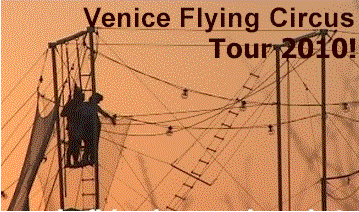 When the new owner of the former Huffman Aviation FBO took over operations at the Venice Airport last month, the Sarasota Herald Tribune was quick to note that the only noticeable change in operations “was a Shell fuel truck on the premises to replace the Chevron brand that former owner Art Nadel sold.”
When the new owner of the former Huffman Aviation FBO took over operations at the Venice Airport last month, the Sarasota Herald Tribune was quick to note that the only noticeable change in operations “was a Shell fuel truck on the premises to replace the Chevron brand that former owner Art Nadel sold.”
The statement was meant to be reassuring. In reality, it was not.
It was business as usual.
And there's anger in Venice, where recent owners of the FBO (Fixed-Base of Operations) at the Venice Municipal Airport have been civic failures on an epic scale.
Art Nadel’s $400 million Ponzi scheme robbed real people—teachers, firemen— of hard-won retirements…
And prior owner Wally Hilliard, who masqueraded as a Mormon deacon while being involved—according to the DEA, which confiscated his Lear jet, denying his pretense of having been an “innocent owner”—in international heroin trafficking.
Hilliard's transgression was made immeasurably worse—worse beyond measure—when Mohamed Atta and a dozen other terrorists exploited the opportunity to create a cozy home base for themselves in the year before the 9/11 attack.
To say the recent past of the former Huffman Aviation at the Venice Airport has been “troubled” is like saying that the economy is going through a “correction.” It's true, as far as it goes, but it doesn't convey the anguish these two men have caused the country, and also the citizens of Venice.
The ingredients for another world-class scandal at the Venice Airport are frighteningly visible. Sleazy characters in expensive suits. Abuse of power. Cover-up.
During the special meeting of the Venice City Council called to consider the lease transfer before the federal bankruptcy judge's deadline, questions were repeatedly raised about why Tri-State would release no financial information on its owners.
Surprisingly, the supposed new owners weren’t forced to answer. Leaping to their defense was an assistant city attorney who repeatedly advised the council they had no reason to object to Wiand’s choice.
Calling the backgrounds of the new managers "blue chip," he said, "As staff we think they have passed the test probably more so than any tenant we've had at the airport."
The city's mayor, Ed Martin, made a remarkable admission that indicated he wasn’t fooled.
"We're not in a position to determine who these people are,” he said. “Whether they are U.S. nationals, or whether they have criminal ties."
Well, Ed. Now you know.